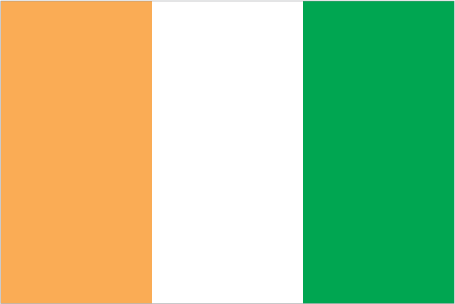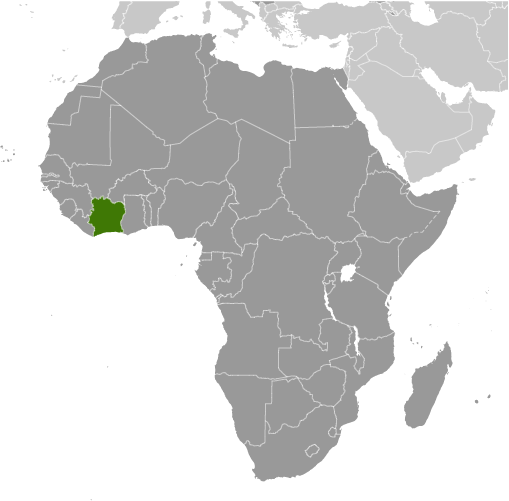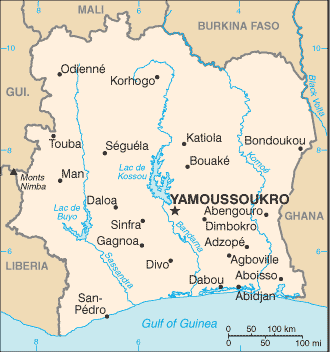Close ties to France since independence in 1960, the development of cocoa production for export, and foreign investment made Cote d'Ivoire one of the most prosperous of the West African states, but did not protect it from political turmoil. In December 1999, a military coup - the first ever in Cote d'Ivoire's history - overthrew the government. Junta leader Robert GUEI blatantly rigged elections held in late 2000 and declared himself the winner. Popular protest forced him to step aside and brought Laurent GBAGBO into power. Ivorian dissidents and disaffected members of the military launched a failed coup attempt in September 2002. Rebel forces claimed the northern half of the country, and in January 2003 were granted ministerial positions in a unity government under the auspices of the Linas-Marcoussis Peace Accord. President GBAGBO and rebel forces resumed implementation of the peace accord in December 2003 after a three-month stalemate, but issues that sparked the civil war, such as land reform and grounds for citizenship, remained unresolved. In March 2007 President GBAGBO and former New Force rebel leader Guillaume SORO signed the Ouagadougou Political Agreement. As a result of the agreement, SORO joined GBAGBO's government as Prime Minister and the two agreed to reunite the country by dismantling the zone of confidence separating North from South, integrate rebel forces into the national armed forces, and hold elections. Disarmament, demobilization, and reintegration of rebel forces have been problematic as rebels seek to enter the armed forces. Citizen identification and voter registration pose election difficulties, and balloting planned for November 2009 was postponed with no future date set. Several thousand UN troops and several hundred French remain in Cote d'Ivoire to help the parties implement their commitments and to support the peace process.
Population
21,058,798
Country comparison to the world: 57
note:estimates for this country explicitly take into account the effects of excess mortality due to AIDS; this can result in lower life expectancy, higher infant mortality, higher death rates, lower population growth rates, and changes in the distribution of population by age and sex than would otherwise be expected (July 2010 est.)
Nationality
Noun:Ivoirian(s)
Adjective: Ivoirian
Ethnic groups
Akan 42.1%, Voltaiques or Gur 17.6%, Northern Mandes 16.5%, Krous 11%, Southern Mandes 10%, other 2.8% (includes 130,000 Lebanese and 14,000 French) (1998)
Religions
Muslim 38.6%, Christian 32.8%, indigenous 11.9%, none 16.7% (2008 est.)
note: the majority of foreigners (migratory workers) are Muslim (70%) and Christian (20%)
Languages
French (official), 60 native dialects with Dioula the most widely spoken
Country Name
Conventional long form:Republic of Cote d'Ivoire
Conventional short form:Cote d'Ivoire
Local long form: Republique de Cote d'Ivoire
Local short form:Cote d'Ivoire
note: pronounced coat-div-whar
Former:Ivory Coast
Government Type
republic; multiparty presidential regime established 1960
note: the government is currently operating under a power-sharing agreement mandated by international mediators
Capital
Name:Yamoussoukro
Geographic coordinates:6 49 N, 5 17 W
Time difference:UTC 0 (5 hours ahead of Washington, DC during Standard Time)
note: although Yamoussoukro has been the official capital since 1983, Abidjan remains the commercial and administrative center; the US, like other countries, maintains its Embassy in Abidjan
Administrative divisions
19 regions; Agneby, Bafing, Bas-Sassandra, Denguele, Dix-Huit Montagnes, Fromager, Haut-Sassandra, Lacs, Lagunes, Marahoue, Moyen-Cavally, Moyen-Comoe, N'zi-Comoe, Savanes, Sud-Bandama, Sud-Comoe, Vallee du Bandama, Worodougou, Zanzan
Independence
7 August 1960 (from France)
National Holiday
Independence Day, 7 August (1960)
Constitution
approved by referendum 23 July 2000
Legal system
based on French civil law system and customary law; judicial review in the Constitutional Chamber of the Supreme Court; accepts compulsory ICJ jurisdiction with reservations
Suffrage
18 years of age; universal
Executive branch
Chief of state:President Laurent GBAGBO (since 26 October 2000)
Head of government:President Laurent GBAGBO (since 26 October 2000)
Cabinet:Council of Ministers appointed by the president; note - under the current power-sharing agreement the prime minister and the president share the authority to appoint ministers
(For more information visit the World Leaders website)
Elections: president elected by popular vote for a five-year term (no term limits); election last held on 26 October 2000 (next to be held undetermined after being repeatedly postponed by the government; the UN Security Council has extended the government's mandate); prime minister appointed by the president
Election results:Laurent GBAGBO elected president; percent of vote - Laurent GBAGBO 59.4%, Robert GUEI 32.7%, Francis WODIE 5.7%, other 2.2%
Legislative branch
unicameral National Assembly or Assemblee Nationale (225 seats; members elected in single- and multi-district elections by direct popular vote to serve five-year terms)
Elections:elections last held on 10 December 2000 with by-elections on 14 January 2001 (elections originally scheduled for 2005 have been repeatedly postponed by the government)
Election results: percent of vote by party - NA; seats by party - FPI 96, PDCI-RDA 94, RDR 5, PIT 4, other 2, independents 22, vacant 2
note: a Senate was scheduled to be created in October 2006 elections that never took place
Judicial branch
Supreme Court or Cour Supreme consists of four chambers: Judicial Chamber for criminal cases, Audit Chamber for financial cases, Constitutional Chamber for judicial review cases, and Administrative Chamber for civil cases; there is no legal limit to the number of members
Political Parties and Leaders
Citizen's Democratic Union or UDCY [Theodore MEL EG]; Democratic Party of Cote d'Ivoire or PDCI [Henri Konan BEDIE]; Ivorian Popular Front or FPI [Pascale Affi N'GUESSAN]; Ivorian Worker's Party or PIT [Francis WODIE]; Opposition Movement of the Future or MFA [Innocent Augustin ANAKY]; Rally of the Republicans or RDR [Alassane OUATTARA]; Union for Democracy and Peace in Cote d'Ivoire or UDPCI [Toikeuse MABRI]; over 144 smaller registered parties
Political pressure groups and leaders
Federation of University and High School Students of Cote d'Ivoire or FESCI [Serges KOFFI]; Rally of Houphouetists for Democracy and Peace or RHDP [Alphonse DJEDJE MADY]; Young Patriots [Charles BLE GOUDE]
International organization participation
ACCT, ACP, AfDB, AU, ECOWAS, Entente, FAO, FZ, G-24, G-77, IAEA, IBRD, ICAO, ICCt (signatory), ICRM, IDA, IDB, IFAD, IFC, IFRCS, ILO, IMF, IMO, Interpol, IOC, IOM, IPU, ITSO, ITU, ITUC, MIGA, NAM, OIC, OIF, OPCW, UN, UNAMID, UNCTAD, UNESCO, UNHCR, UNIDO, Union Latina, UNWTO, UPU, WADB (regional), WAEMU, WCO, WFTU, WHO, WIPO, WMO, WTO
Diplomatic representation in the US
chief of mission: Ambassador Yao Charles KOFFI
chancery: 2424 Massachusetts Avenue NW, Washington, DC 20008
telephone: [1] (202) 797-0300
FAX: [1] (202) 244-3088
Diplomatic representation from the US
chief of mission: Ambassador Wanda L. NESBITT
embassy: Cocody Riviera Golf 01, Abidjan
mailing address: B. P. 1712, Abidjan 01
telephone: [225] 22 49 40 00
FAX: [225] 22 49 43 32
Flag description
three equal vertical bands of orange (hoist side), white, and green; orange symbolizes the land (savannah) of the north and fertility, white stands for peace and unity, green represents the forests of the south and the hope for a bright future
note: similar to the flag of Ireland, which is longer and has the colors reversed - green (hoist side), white, and orange; also similar to the flag of Italy, which is green (hoist side), white, and red; design was based on the flag of France










